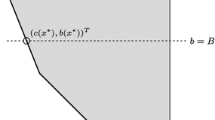Abstract
We present two efficient algorithms for solving the electric power transaction problem. The electric power transaction problem appears when maximizing the social benefit on electric power transactions among some private companies. The problem is a special case of the minimum cost flow problem defined on a network with many leaves, where each leaf corresponds to a (private) company who wants to sell or buy electric power.
Our first algorithm is based on the minimum mean cycle canceling algorithm and the second algorithm uses a linear time median finding algorithm. The first algorithm finds an optimal solution in O(nlogn k 5log(kC)) time where n is the number of leaves, k is the number of non-leaf vertices and C is the highest electric power price per unit that companies may offer. The time complexity of the second algorithm is bounded by O((n + k 3)2k k!) time, which is linear in n. In many practical instances, k is small and n is very large, hence these algorithms solve the problem more efficiently than the ordinary network flow algorithms.
Preview
Unable to display preview. Download preview PDF.
Similar content being viewed by others
References
Blum, M., Floyd, R.W., Pratt, V., Rivest, R.L., Tarjan, R.E.: Time bounds for selection. Journal of Computer and System Sciences 7, 448–461 (1973)
Edmonds, J., Karp, R.M.: Theoretical improvements in algorithmic efficiency for network flow problems. Journal of the ACM 19, 248–264 (1972)
Ford Jr., L.R., Fulkerson, D.R.: Flows in Networks. Princeton University Press, Princeton (1962)
Goldberg, A.V., Tarjan, R.E.: Solving minimum-cost flow problems by successive approximation. In: Proceedings of the 19th Annual ACM Symposium on The Theory of Computing, pp. 7–18 (1987)
Goldberg, A.V., Tarjan, R.E.: Finding minimum-cost circulations by canceling negative cycles. Journal of the ACM 36, 873–886 (1989)
Klein, M.: A primal method for minimal cost flows with applications to the assignment and transportation problems. Management Science 14, 205–220 (1967)
Orlin, J.B.: A faster strongly polynomial minimum cost flow algorithm. In: Proceedings of the 20th Annual ACM Symposium on the Theory of Computing, pp. 377–387 (1988)
Author information
Authors and Affiliations
Editor information
Editors and Affiliations
Rights and permissions
Copyright information
© 2005 Springer-Verlag Berlin Heidelberg
About this paper
Cite this paper
Kiyomi, M., Uno, T., Matsui, T. (2005). Efficient Algorithms for the Electric Power Transaction Problem. In: Deng, X., Ye, Y. (eds) Internet and Network Economics. WINE 2005. Lecture Notes in Computer Science, vol 3828. Springer, Berlin, Heidelberg. https://doi.org/10.1007/11600930_60
Download citation
DOI: https://doi.org/10.1007/11600930_60
Publisher Name: Springer, Berlin, Heidelberg
Print ISBN: 978-3-540-30900-0
Online ISBN: 978-3-540-32293-1
eBook Packages: Computer ScienceComputer Science (R0)




